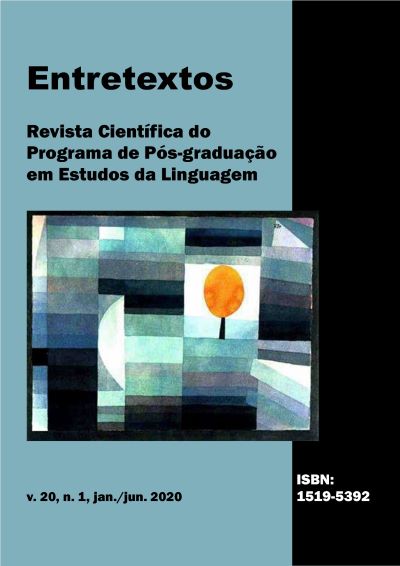The enunciator in a short story by Clarice Lispector
DOI:
https://doi.org/10.5433/1519-5392.2020v20n1p241Keywords:
Linguistic variety, Semiotic, Enunciation, LiteratureAbstract
This article aims to demonstrate how a enunciator, native speaker of
Brazilian Portuguese, creates a discourse on what show itself as a native speaker of European Portuguese. Intends to answer the following questions: a) Why a writer speaker of the Brazilian Portuguese writes a short story that uses the European Portuguese? b) Which are the effects in terms of sense produced by the use of this variety? The theory foundation relies on the Discursive Semiotics and in the theory of
the enunciation. The methodologic consists in the analysis of the short story Devaneio e embriaguez duma rapariga, by Clarice Lispector, from the lexical and synthetic choices of the enunciator expressed in the plan of expression. Discourses in which Brazilian Portuguese speakers seek to reproduce the European Portuguese variety usually makes use of stereotyped procedures: in the oral language focus on the attempt to reproduced the prosodic aspects; in the written, relies mostly in the use of a lexicon that attests the differences between the two varieties. The analysis results show that the enunciator, to draw for the enunciate the image of a native speaker of the European Portuguese, did not limit itself to linguistic aspects, but also to discursive aspects, especially those related to the projection of the categories from enunciation in the discursive level.
Downloads
References
BACHELARD, Gaston. A poética do espaço. 2. ed. Tradução de Antônio da Costa Leal e Lídia do Valle Santos Leal. São Paulo: Martins Fontes, 2008.
BAKHTIN, Mikhail. Teoria do romance II: As formas do tempo e do cronotopo. Tradução de Paulo Bezerra. São Paulo: Editora 34, 2018.
CARONE, Flávia de Barros. Morfossintaxe. 8. ed. São Paulo: Ática, 1999.
LISPECTOR, Clarice. Apêndice: a explicação inútil. In: LISPECTOR, Clarice. Todos os contos. Organização de Benjamin Moser. Rio de Janeiro: Editora Rocco, 2016a. p. 643-644.
LISPECTOR, Clarice. Devaneio e embriaguez duma rapariga. In: LISPECTOR, Clarice. Todos os contos. Organização de Benjamin Moser. Rio de Janeiro: Editora Rocco, 2016b. p. 135-144.
MIRA MATEUS, Maria Helena; BRITO, Ana Maria; DUARTE, Inês, HUB FARIAIsabel. Gramática da língua portuguesa. 2. ed. Lisboa: Editorial Caminho, 1989. (Coleção Universitária. Série Linguística).
NEVES, Maria Helena de. A gramática do português revelada em textos. São Paulo: Editora UNESP, 2018.
ORLANDI, Eni Pucinelli. Língua e conhecimento linguístico: para uma história das ideias no Brasil. São Paulo: Editora Cortez, 2002.
ZILBERBERG, Claude. Elementos de semiótica tensiva. Tradução de Ivã Carlos Lopes, Luiz Tatit e Waldir Beividas. São Paulo: Ateliê Editorial, 2011.
Downloads
Published
How to Cite
Issue
Section
License
Copyright (c) 2020 Entretextos

This work is licensed under a Creative Commons Attribution 4.0 International License.
Entretextos adota a Licença Creative Commons Attribution 4.0 International, portanto, os direitos autorais relativos aos artigos publicados são do/s autor/es.
Sob essa licença é possível: Compartilhar - copiar e redistribuir o material em qualquer suporte ou formato. Adaptar - remixar, transformar, e criar a partir do material, atribuindo o devido crédito e prover um link para a licença e indicar se mudanças foram feitas.























